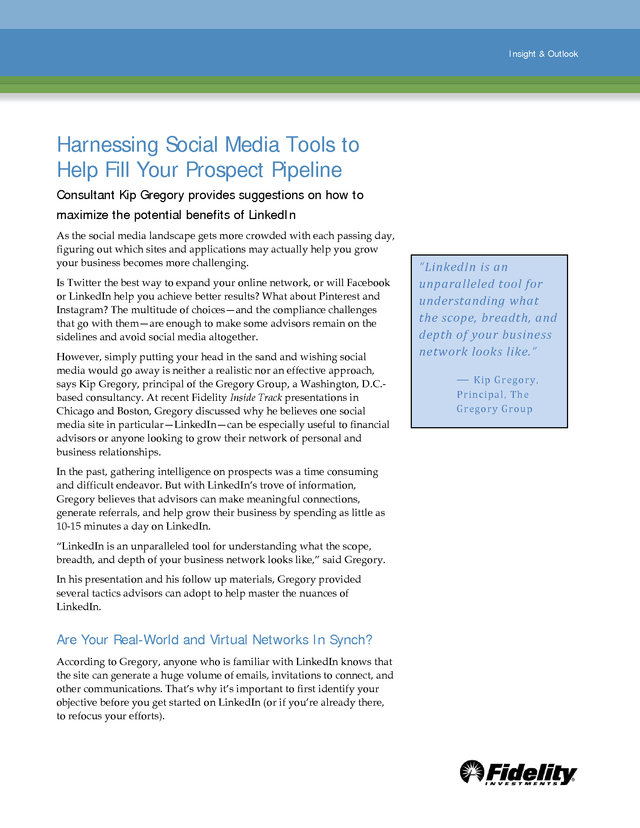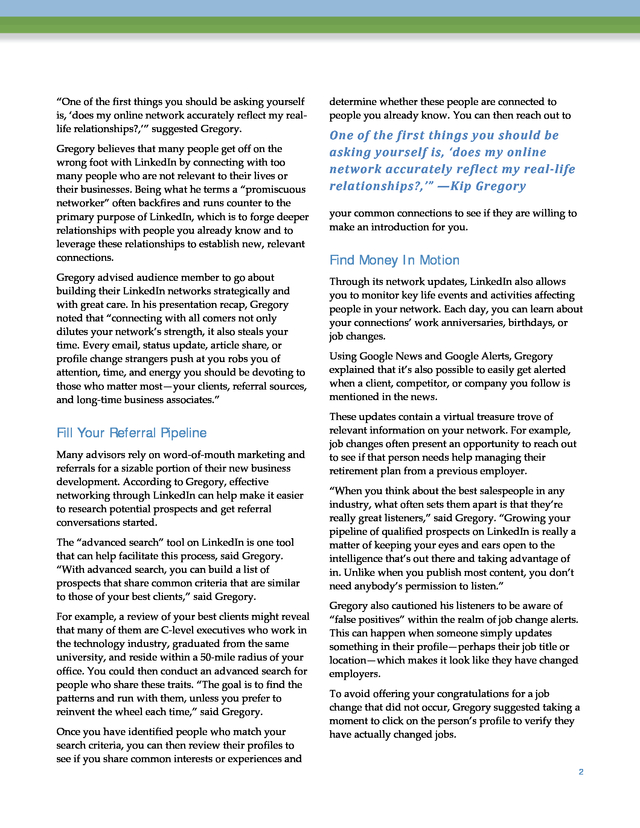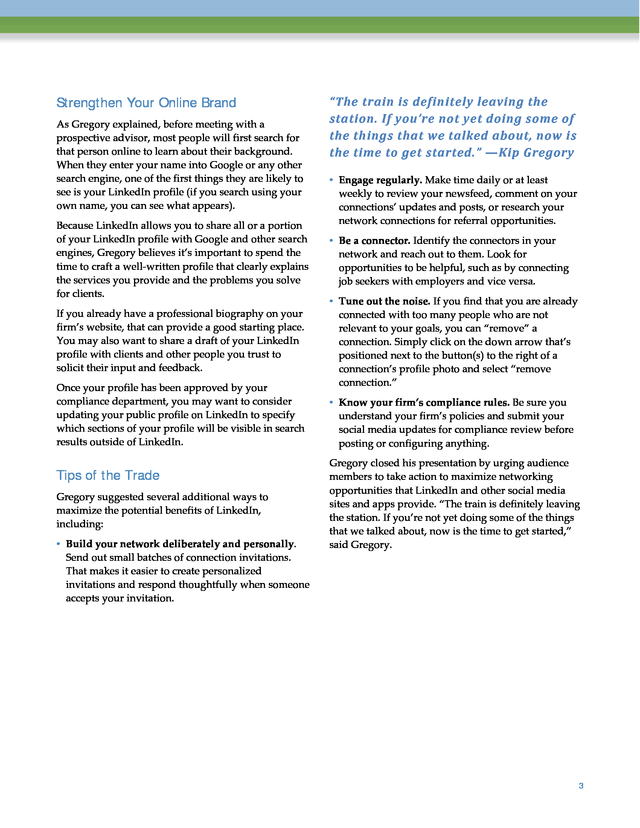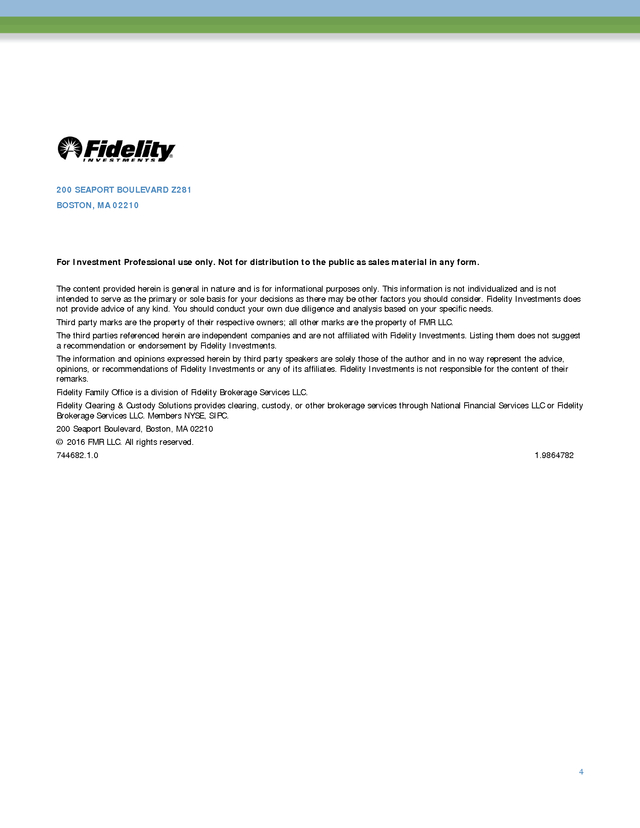Harnessing Social Media Tools to Help Fill Your Prospect Pipeline Article
National Financial Services
Description
Insight & Outlook
Harnessing Social Media Tools to
Help Fill Your Prospect Pipeline
Consultant Kip Gregory provides suggestions on how to
maximize the potential benefits of LinkedIn
As the social media landscape gets more crowded with each passing day,
figuring out which sites and applications may actually help you grow
your business becomes more challenging.
Is Twitter the best way to expand your online network, or will Facebook
or LinkedIn help you achieve better results? What about Pinterest and
Instagram? The multitude of choices—and the compliance challenges
that go with them—are enough to make some advisors remain on the
sidelines and avoid social media altogether.
However, simply putting your head in the sand and wishing social
media would go away is neither a realistic nor an effective approach,
says Kip Gregory, principal of the Gregory Group, a Washington, D.C.based consultancy. At recent Fidelity Inside Track presentations in
Chicago and Boston, Gregory discussed why he believes one social
media site in particular—LinkedIn—can be especially useful to financial
advisors or anyone looking to grow their network of personal and
business relationships.
In the past, gathering intelligence on prospects was a time consuming
and difficult endeavor. But with LinkedIn’s trove of information,
Gregory believes that advisors can make meaningful connections,
generate referrals, and help grow their business by spending as little as
10-15 minutes a day on LinkedIn.
“LinkedIn is an unparalleled tool for understanding what the scope,
breadth, and depth of your business network looks like,” said Gregory.
In his presentation and his follow up materials, Gregory provided
several tactics advisors can adopt to help master the nuances of
LinkedIn.
Are Your Real-World and Virtual Networks In Synch?
According to Gregory, anyone who is familiar with LinkedIn knows that
the site can generate a huge volume of emails, invitations to connect, and
other communications. That’s why it’s important to first identify your
objective before you get started on LinkedIn (or if you’re already there,
to refocus your efforts).
“LinkedIn is an
unparalleled tool for
understanding what
the scope, breadth, and
depth of your business
network looks like.”
— Kip Gregory,
Principal, The
Gregory Group
.
“One of the first things you should be asking yourself is, ‘does my online network accurately reflect my reallife relationships?,’” suggested Gregory. Gregory believes that many people get off on the wrong foot with LinkedIn by connecting with too many people who are not relevant to their lives or their businesses. Being what he terms a “promiscuous networker” often backfires and runs counter to the primary purpose of LinkedIn, which is to forge deeper relationships with people you already know and to leverage these relationships to establish new, relevant connections. Gregory advised audience member to go about building their LinkedIn networks strategically and with great care. In his presentation recap, Gregory noted that “connecting with all comers not only dilutes your network’s strength, it also steals your time. Every email, status update, article share, or profile change strangers push at you robs you of attention, time, and energy you should be devoting to those who matter most—your clients, referral sources, and long-time business associates.” Fill Your Referral Pipeline Many advisors rely on word-of-mouth marketing and referrals for a sizable portion of their new business development.
According to Gregory, effective networking through LinkedIn can help make it easier to research potential prospects and get referral conversations started. The “advanced search” tool on LinkedIn is one tool that can help facilitate this process, said Gregory. “With advanced search, you can build a list of prospects that share common criteria that are similar to those of your best clients,” said Gregory. For example, a review of your best clients might reveal that many of them are C-level executives who work in the technology industry, graduated from the same university, and reside within a 50-mile radius of your office. You could then conduct an advanced search for people who share these traits. “The goal is to find the patterns and run with them, unless you prefer to reinvent the wheel each time,” said Gregory. Once you have identified people who match your search criteria, you can then review their profiles to see if you share common interests or experiences and determine whether these people are connected to people you already know.
You can then reach out to One of the first things you should be asking yourself is, ‘does my online network accurately reflect my real-life relationships?,’” —Kip Gregory your common connections to see if they are willing to make an introduction for you. Find Money In Motion Through its network updates, LinkedIn also allows you to monitor key life events and activities affecting people in your network. Each day, you can learn about your connections’ work anniversaries, birthdays, or job changes. Using Google News and Google Alerts, Gregory explained that it’s also possible to easily get alerted when a client, competitor, or company you follow is mentioned in the news. These updates contain a virtual treasure trove of relevant information on your network. For example, job changes often present an opportunity to reach out to see if that person needs help managing their retirement plan from a previous employer. “When you think about the best salespeople in any industry, what often sets them apart is that they’re really great listeners,” said Gregory.
“Growing your pipeline of qualified prospects on LinkedIn is really a matter of keeping your eyes and ears open to the intelligence that’s out there and taking advantage of in. Unlike when you publish most content, you don’t need anybody’s permission to listen.” Gregory also cautioned his listeners to be aware of “false positives” within the realm of job change alerts. This can happen when someone simply updates something in their profile—perhaps their job title or location—which makes it look like they have changed employers. To avoid offering your congratulations for a job change that did not occur, Gregory suggested taking a moment to click on the person’s profile to verify they have actually changed jobs. 2 . Strengthen Your Online Brand As Gregory explained, before meeting with a prospective advisor, most people will first search for that person online to learn about their background. When they enter your name into Google or any other search engine, one of the first things they are likely to see is your LinkedIn profile (if you search using your own name, you can see what appears). Because LinkedIn allows you to share all or a portion of your LinkedIn profile with Google and other search engines, Gregory believes it’s important to spend the time to craft a well-written profile that clearly explains the services you provide and the problems you solve for clients. If you already have a professional biography on your firm’s website, that can provide a good starting place. You may also want to share a draft of your LinkedIn profile with clients and other people you trust to solicit their input and feedback. Once your profile has been approved by your compliance department, you may want to consider updating your public profile on LinkedIn to specify which sections of your profile will be visible in search results outside of LinkedIn. Tips of the Trade Gregory suggested several additional ways to maximize the potential benefits of LinkedIn, including: • Build your network deliberately and personally. Send out small batches of connection invitations. That makes it easier to create personalized invitations and respond thoughtfully when someone accepts your invitation. “The train is definitely leaving the station. If you’re not yet doing some of the things that we talked about, now is the time to get started.” —Kip Gregory • Engage regularly. Make time daily or at least weekly to review your newsfeed, comment on your connections’ updates and posts, or research your network connections for referral opportunities. • Be a connector. Identify the connectors in your network and reach out to them.
Look for opportunities to be helpful, such as by connecting job seekers with employers and vice versa. • Tune out the noise. If you find that you are already connected with too many people who are not relevant to your goals, you can “remove” a connection. Simply click on the down arrow that’s positioned next to the button(s) to the right of a connection’s profile photo and select “remove connection.” • Know your firm’s compliance rules.
Be sure you understand your firm’s policies and submit your social media updates for compliance review before posting or configuring anything. Gregory closed his presentation by urging audience members to take action to maximize networking opportunities that LinkedIn and other social media sites and apps provide. “The train is definitely leaving the station. If you’re not yet doing some of the things that we talked about, now is the time to get started,” said Gregory. 3 .
200 SEAPORT BOULEVARD Z281 BOSTON, MA 02210 For Investment Professional use only. Not for distribution to the public as sales material in any form. The content provided herein is general in nature and is for informational purposes only. This information is not individualized and is not intended to serve as the primary or sole basis for your decisions as there may be other factors you should consider. Fidelity Investments does not provide advice of any kind.
You should conduct your own due diligence and analysis based on your specific needs. Third party marks are the property of their respective owners; all other marks are the property of FMR LLC. The third parties referenced herein are independent companies and are not affiliated with Fidelity Investments. Listing them does not suggest a recommendation or endorsement by Fidelity Investments. The information and opinions expressed herein by third party speakers are solely those of the author and in no way represent the advice, opinions, or recommendations of Fidelity Investments or any of its affiliates. Fidelity Investments is not responsible for the content of their remarks. Fidelity Family Office is a division of Fidelity Brokerage Services LLC. Fidelity Clearing & Custody Solutions provides clearing, custody, or other brokerage services through National Financial Services LLC or Fidelity Brokerage Services LLC.
Members NYSE, SIPC. 200 Seaport Boulevard, Boston, MA 02210 © 2016 FMR LLC. All rights reserved. 744682.1.0 1.9864782 4 .
“One of the first things you should be asking yourself is, ‘does my online network accurately reflect my reallife relationships?,’” suggested Gregory. Gregory believes that many people get off on the wrong foot with LinkedIn by connecting with too many people who are not relevant to their lives or their businesses. Being what he terms a “promiscuous networker” often backfires and runs counter to the primary purpose of LinkedIn, which is to forge deeper relationships with people you already know and to leverage these relationships to establish new, relevant connections. Gregory advised audience member to go about building their LinkedIn networks strategically and with great care. In his presentation recap, Gregory noted that “connecting with all comers not only dilutes your network’s strength, it also steals your time. Every email, status update, article share, or profile change strangers push at you robs you of attention, time, and energy you should be devoting to those who matter most—your clients, referral sources, and long-time business associates.” Fill Your Referral Pipeline Many advisors rely on word-of-mouth marketing and referrals for a sizable portion of their new business development.
According to Gregory, effective networking through LinkedIn can help make it easier to research potential prospects and get referral conversations started. The “advanced search” tool on LinkedIn is one tool that can help facilitate this process, said Gregory. “With advanced search, you can build a list of prospects that share common criteria that are similar to those of your best clients,” said Gregory. For example, a review of your best clients might reveal that many of them are C-level executives who work in the technology industry, graduated from the same university, and reside within a 50-mile radius of your office. You could then conduct an advanced search for people who share these traits. “The goal is to find the patterns and run with them, unless you prefer to reinvent the wheel each time,” said Gregory. Once you have identified people who match your search criteria, you can then review their profiles to see if you share common interests or experiences and determine whether these people are connected to people you already know.
You can then reach out to One of the first things you should be asking yourself is, ‘does my online network accurately reflect my real-life relationships?,’” —Kip Gregory your common connections to see if they are willing to make an introduction for you. Find Money In Motion Through its network updates, LinkedIn also allows you to monitor key life events and activities affecting people in your network. Each day, you can learn about your connections’ work anniversaries, birthdays, or job changes. Using Google News and Google Alerts, Gregory explained that it’s also possible to easily get alerted when a client, competitor, or company you follow is mentioned in the news. These updates contain a virtual treasure trove of relevant information on your network. For example, job changes often present an opportunity to reach out to see if that person needs help managing their retirement plan from a previous employer. “When you think about the best salespeople in any industry, what often sets them apart is that they’re really great listeners,” said Gregory.
“Growing your pipeline of qualified prospects on LinkedIn is really a matter of keeping your eyes and ears open to the intelligence that’s out there and taking advantage of in. Unlike when you publish most content, you don’t need anybody’s permission to listen.” Gregory also cautioned his listeners to be aware of “false positives” within the realm of job change alerts. This can happen when someone simply updates something in their profile—perhaps their job title or location—which makes it look like they have changed employers. To avoid offering your congratulations for a job change that did not occur, Gregory suggested taking a moment to click on the person’s profile to verify they have actually changed jobs. 2 . Strengthen Your Online Brand As Gregory explained, before meeting with a prospective advisor, most people will first search for that person online to learn about their background. When they enter your name into Google or any other search engine, one of the first things they are likely to see is your LinkedIn profile (if you search using your own name, you can see what appears). Because LinkedIn allows you to share all or a portion of your LinkedIn profile with Google and other search engines, Gregory believes it’s important to spend the time to craft a well-written profile that clearly explains the services you provide and the problems you solve for clients. If you already have a professional biography on your firm’s website, that can provide a good starting place. You may also want to share a draft of your LinkedIn profile with clients and other people you trust to solicit their input and feedback. Once your profile has been approved by your compliance department, you may want to consider updating your public profile on LinkedIn to specify which sections of your profile will be visible in search results outside of LinkedIn. Tips of the Trade Gregory suggested several additional ways to maximize the potential benefits of LinkedIn, including: • Build your network deliberately and personally. Send out small batches of connection invitations. That makes it easier to create personalized invitations and respond thoughtfully when someone accepts your invitation. “The train is definitely leaving the station. If you’re not yet doing some of the things that we talked about, now is the time to get started.” —Kip Gregory • Engage regularly. Make time daily or at least weekly to review your newsfeed, comment on your connections’ updates and posts, or research your network connections for referral opportunities. • Be a connector. Identify the connectors in your network and reach out to them.
Look for opportunities to be helpful, such as by connecting job seekers with employers and vice versa. • Tune out the noise. If you find that you are already connected with too many people who are not relevant to your goals, you can “remove” a connection. Simply click on the down arrow that’s positioned next to the button(s) to the right of a connection’s profile photo and select “remove connection.” • Know your firm’s compliance rules.
Be sure you understand your firm’s policies and submit your social media updates for compliance review before posting or configuring anything. Gregory closed his presentation by urging audience members to take action to maximize networking opportunities that LinkedIn and other social media sites and apps provide. “The train is definitely leaving the station. If you’re not yet doing some of the things that we talked about, now is the time to get started,” said Gregory. 3 .
200 SEAPORT BOULEVARD Z281 BOSTON, MA 02210 For Investment Professional use only. Not for distribution to the public as sales material in any form. The content provided herein is general in nature and is for informational purposes only. This information is not individualized and is not intended to serve as the primary or sole basis for your decisions as there may be other factors you should consider. Fidelity Investments does not provide advice of any kind.
You should conduct your own due diligence and analysis based on your specific needs. Third party marks are the property of their respective owners; all other marks are the property of FMR LLC. The third parties referenced herein are independent companies and are not affiliated with Fidelity Investments. Listing them does not suggest a recommendation or endorsement by Fidelity Investments. The information and opinions expressed herein by third party speakers are solely those of the author and in no way represent the advice, opinions, or recommendations of Fidelity Investments or any of its affiliates. Fidelity Investments is not responsible for the content of their remarks. Fidelity Family Office is a division of Fidelity Brokerage Services LLC. Fidelity Clearing & Custody Solutions provides clearing, custody, or other brokerage services through National Financial Services LLC or Fidelity Brokerage Services LLC.
Members NYSE, SIPC. 200 Seaport Boulevard, Boston, MA 02210 © 2016 FMR LLC. All rights reserved. 744682.1.0 1.9864782 4 .

















